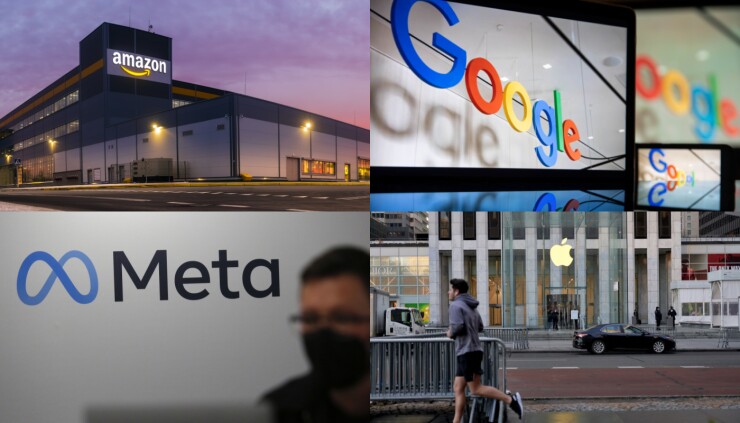Big tech companies are calling on the Federal Reserve to build a backbone for real-time payments in the United States, leaving the nation’s largest banks increasingly isolated in their opposition to the idea.
Amazon, Apple and Google all declared their support Friday for the Fed taking a central role in the development of a modernized system that would connect all U.S. banks and credit unions. They were joined by other tech firms PayPal, Square, Stripe and Intuit.
“Only the Federal Reserve can serve as the catalyst to achieve real-time payments ubiquity in a timely manner,” the tech companies said in a letter submitted by a trade group.

The letter came in response to a request for comment on what the Fed’s role should be in fostering broad adoption of faster payments. The hot-button question that the Fed posed is whether it should build a round-the-clock system for settling payments in real time, or leave that task to the private sector.
In arguing that the Fed should be more proactive, the tech giants noted that the central bank plays a similar role for other payment methods such as checks and wire transfers.
Large retailers such as Walmart and Target, small banks and consumer advocates all generally agree with the tech companies’ view,
Some of the nation’s largest banks are already operating their own real-time system through The Clearing House, the payments company that they co-own. That system, known as RTP, has yet to be adopted by smaller financial institutions.
The big banks argue that a competing system from the Fed would slow progress at a time when the U.S is far behind many other countries where money already moves in real time. They also say that it may be hard to ensure interoperability between two next-generation systems.
“If the Federal Reserve were to offer a service that was not interoperable, the effect on the faster payments marketplace would be dramatic,” BB&T CEO Kelly King wrote in a comment letter to the Fed. Winston-Salem, N.C.-based BB&T is among the 25 banks that co-own The Clearing House.
In a scenario where the U.S. has two real-time payment systems, but they are not interoperable, banks will either have to use both of them, which would be expensive and inefficient, or they will risk losing customers who are unable to complete certain transactions, King warned.
But small banks argued that unless the Fed builds a settlement system, they will be at the mercy of larger banks, which will have the power to set prices.
“As a rural, community bank, I cannot depend on the benevolence of the largest 25 banks in the country,” commented Mark Field, the chairman and president of the $92 million-asset Liberty Bank in western Illinois.
Tiny banks such as Liberty have found an ally in tech firms that are among the most valuable companies in the world.
The tech giants said in their joint comments to the Fed that consumers increasingly want real-time payments. They also said that services they have introduced in recent years are largely responsible for consumers' changing expectations.
In its own comments to the Fed, Amazon argued that the existing credit and debit card payment systems are expensive, and said that a settlement system from the Fed would help to ensure that there is a long-term alternative. Retailers frequently decry the prices they pay to process card payments.
Mountain View, Calif.-based Google said in its comments that interoperability between multiple real-time systems is important, but suggested that the Fed does not need to solve that issue before moving forward. Google said that software can be built by third parties on top of the Fed’s system to support interoperability.
“We believe that time is of the essence,” Google’s letter stated, noting that “the U.S. is already behind many other countries that have implemented real-time payments, such as India, the United Kingdom, Australia and Singapore.”
Rachel Witkowski contributed to this story.





